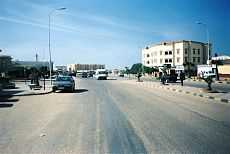United Nations Security Council Resolution 1495
| UN Security Council Resolution 1495 | |
|---|---|
|
Boujdour in Western Sahara | |
| Date | 31 July 2003 |
| Meeting no. | 4,801 |
| Code | S/RES/1495 (Document) |
| Subject | The situation concerning Western Sahara |
Voting summary |
15 voted for None voted against None abstained |
| Result | Adopted |
| Security Council composition | |
Permanent members | |
Non-permanent members | |
| Part of a series on the |
| Western Sahara conflict |
|---|
 |
| Background |
| Disputed regions |
| Politics |
| Rebellions |
| Issues |
| Peace process |
United Nations Security Council resolution 1495, adopted unanimously on 31 July 2003, after recalling all previous resolutions on the situation in Western Sahara, particularly Resolution 1429 (2002), the Council extended the mandate of the United Nations Mission for the Referendum in Western Sahara (MINURSO) until 31 October 2003 and supported the Baker Plan put forth by James Baker III, who was at that time the Special Representative for Western Sahara of the Secretary-General Kofi Annan, as a replacement of the 1991 Settlement Plan.[1] The resolution, adopted after significant changes to the original draft,[2] was welcomed by the Polisario Front, which supported the Baker Plan, but not by Morocco, which resisted it.[3]
Resolution
Observations
The Security Council was concerned at the lack of progress towards a political solution to the dispute between Morocco and the Polisario Front, which remained a potential source of instability to the Maghreb region.[4] It reaffirmed its commitment to assist the parties in achieving a durable solution which will provide for the self-determination of the people of Western Sahara. The parties were commended for their respect of the ceasefire and MINURSO's efforts were also praised.
Acts
Acting under Chapter VI of the United Nations Charter, the Council supported the Baker Plan as the "optimum political solution" to the dispute and called upon both parties to work towards the acceptance and implementation of the plan.[5] Furthermore, the parties and states in the region were asked to co-operate with the Secretary-General and his Personal Envoy.[4]
The resolution called upon the Polisario Front to release all remaining prisoners of war under international humanitarian law and for both parties to co-operate with the International Committee of the Red Cross to resolve the issue of persons unaccounted for since the start of the conflict.[4] The parties were urged to implement confidence-building measures with the United Nations High Commissioner for Refugees (UNHCR) and for the international community to support the UNHCR and World Food Programme in overcoming the deteriorating food situation among refugees.
Finally, the Secretary-General was asked to provide an assessment of the situation before 31 October 2003.
See also
- Free Zone (region)
- Legal status of Western Sahara
- List of United Nations Security Council Resolutions 1401 to 1500 (2002–2003)
- Sahrawi Arab Democratic Republic
- Wall (Western Sahara)
References
- ↑ "Security Council extends mandate of Western Sahara mission, calls on parties to work towards acceptance of Special Envoy's peace plan". United Nations. 31 July 2003.
- ↑ Bamford, David (31 July 2003). "UN agrees Sahara peace deal". BBC News.
- ↑ "Morocco Rejects Latest UN Peace Plan for Western Sahara". AllAfrica.com. 1 August 2003.
- ↑ 4.0 4.1 4.2 McCormack, T.; McDonald, Avril (2006). Yearbook of International Humanitarian Law – 2003, Volume 6; Volume 2003. Cambridge University Press. pp. 281–282. ISBN 978-90-6704-203-1.
- ↑ Souare, Issaka K. (2007). Western Sahara: is there light at the end of the tunnel?. Institute for Security Studies (South Africa). p. 5.
External links
| Wikisource has original text related to this article: |
| ||||||
